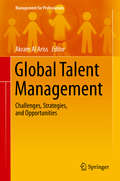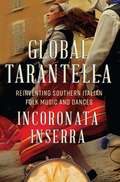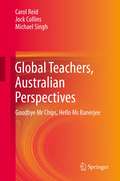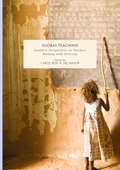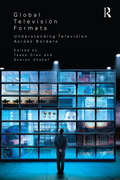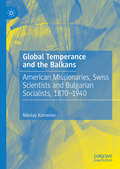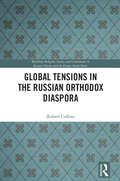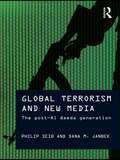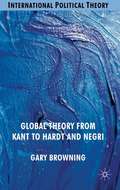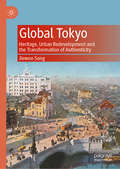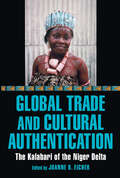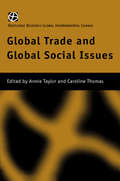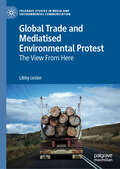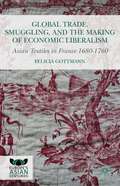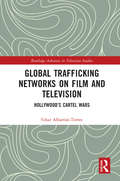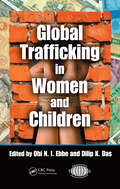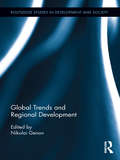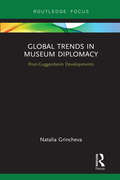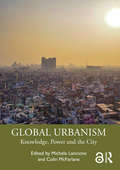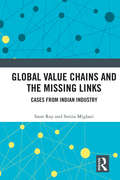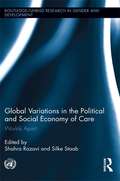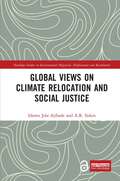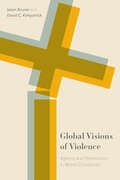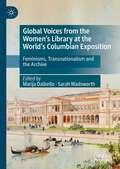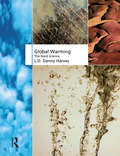- Table View
- List View
Global Talent Management
by Akram Al ArissThis book bridges the research and practice of global talent management. It opens important theoretical and practical avenues to understand the concept internationally while focusing on developing and emerging countries. Chapters derive from various geographic regions and embrace cross-national, comparative, and interdisciplinary perspectives. An open and inclusive approach is used in assessing the challenges of global talent management, strategies to overcome these challenges, and in charting opportunities for future talent management. These three dimensions are crucial to academic researchers and business practitioners for envisioning a positive future role of talent management in businesses and societies.
Global Tarantella: Reinventing Southern Italian Folk Music and Dances
by Incoronata InserraTarantella, a genre of Southern Italian folk music and dance, is an international phenomenon--seen and heard in popular festivals, performed across the Italian diaspora, even adapted for New Age spiritual practices. The boom in popularity has diversified tarantella in practice while setting it within a host of new, unexpected contexts. Incoronata Inserra ventures into the history, global circulation, and recontextualization of this fascinating genre. Examining tarantella's changing image and role among Italians and Italian Americans, Inserra illuminates how factors like tourism, translation, and world music venues have shifted the ethics of place embedded in the tarantella cultural tradition. Once rural, religious, and rooted, tarantella now thrives in settings urban, secular, migrant, and ethnic. Inserra reveals how the genre's changing dynamics contribute to reimagining Southern Italian identity. At the same time, they translate tarantella into a different kind of performance that serves new social and cultural groups and purposes. Indeed, as Inserra shows, tarantella's global growth promotes a reassessment of gender relations in the Italian South and helps create space for Italian and Italian-American women to reclaim gendered aspects of the genre.
Global Teachers, Australian Perspectives: Goodbye Mr Chips, Hello Ms Banerjee
by Michael Singh Jock Collins Carol ReidThis is the first book on global teachers and the increasingly important phenomenon of 'brain circulation' in the global teaching profession. A teaching qualification is a passport to an international professional career: the global teacher is found in more and more classrooms around the world today. It is a two-way movement. This book looks at the growing importance of immigrant teachers in western countries today and at teachers who exit from western countries (emigrant teachers) seeking teaching experience in other countries. Drawing on the international literature in Europe, North America, Asia and elsewhere supplemented by rich insights derived from recent Australian research, the book outlines the personal, institutional and structural processes nationally and internationally underlying the increasing global circulation of teachers. It identifies the key drivers of global teacher mobility: a range of factors including family, lifestyle, classroom experience, travel, opportunities for advancement, discipline, linguistic skills, taxation rates, cultural factors and institutional frameworks and policy support. The book is the first detailed contemporary account of the experiences of Australian immigrant and emigrant teachers in the schools and communities where they teach and live. It makes an important and original theoretical and empirical contribution to the contemporary fields of sociology of education and immigration studies.
Global Teaching: Southern Perspectives on Teachers Working with Diversity (Education Dialogues with/in the Global South)
by Carol Reid and Jae MajorAt a time when social, cultural and linguistic diversity has become a characteristic of education systems around the world, this timely text considers how teacher education is responding to these developments in the context of increased mobilities within and across national boundaries. This collection draws together the work of scholars, from a range of urban, rural and national contexts from the Global South and North, who engage in dialogue about diversity and knowledge exchange. It includes perspectives from multiple contexts using a range of frameworks that cohere around attention to issues of equity and social justice, and focuses on the macro level dynamics (policy, theory, global governance) as well as meso (institutional practices) and micro dimensions (professional identities, cultural, and identity transformation). The authors explore these dynamics and dimensions through mobilities of teachers and students, cosmopolitan theory, indigenous epistemologies, language ecology, professional standards policy discourses, and critical analyses of frameworks including postcolonialism, multiculturalism and culturally responsive and relevant pedagogical approaches.
Global Television Formats: Understanding Television Across Borders
by Tasha Oren Sharon ShahafWinner of the 2013 SCMS Best Edited Collection Award For decades, television scholars have viewed global television through the lens of cultural imperialism, focusing primarily on programs produced by US and UK markets and exported to foreign markets. Global Television Formats revolutionizes television studies by de-provincializing its approach to media globalization. It re-examines dominant approaches and their legacies of global/local and center/periphery, and offers new directions for understanding television’s contemporary incarnations. The chapters in this collection take up the format phenomena from around the globe, including the Middle East, Western and Eastern Europe, South and West Africa, South and East Asia, Australia and New Zealand, North America, South America, and the Caribbean. Contributors address both little known examples and massive global hits ranging from the Idol franchise around the world, to telenovelas, dance competitions, sports programming, reality TV, quiz shows, sitcoms and more. Looking to global television formats as vital for various cultural meanings, relationships, and structures, this collection shows how formats can further our understanding of television and the culture of globalization at large.
Global Temperance and the Balkans: American Missionaries, Swiss Scientists and Bulgarian Socialists, 1870–1940
by Nikolay KamenovThis book examines the local manifestation of the global temperance movement in the Balkans. It argues that regional histories of social movements in the modern period could not be sufficiently understood in isolation. Moreover, the book argues that broad transformations of social movements – for example, the power centers associated with moral/religious temperance and the later, scientifically based anti-alcohol campaigns – are more easily identifiable through a detailed regional study. For this purpose, the book begins by sketching the historical development as well as the main historiographical themes surrounding the worldwide temperance movement. The book then zooms in on the movement in the Balkans and Bulgaria in particular. American missionaries founded the temperance movement in the closing decades of the nineteenth century. The interwar period, however, witnessed the proliferation of new, professional organizations. The book discusses the various branches as well as their international and political affiliations, showing that the anti-alcohol reform movement was one of the most important social movements in the region.
Global Tensions in the Russian Orthodox Diaspora (Routledge Religion, Society and Government in Eastern Europe and the Former Soviet States)
by Robert CollinsThis book explores the tensions which have arisen in the disapora as a result of large numbers of Russian migrants entering established overseas parishes following the collapse of the Soviet Union. These tensions, made more fervent by the increasing role of the Church as part of the expression of Russian identity, and by the Church’s entry into the global ‘culture wars’, carry with them alternative views of a range of key issues – cosmopolitanism versus reservation, liberalism versus conservatism, and ecumenism versus dogmatism. The book focuses on particular disputes, discusses the broader debates and examines the wider context of how the Russian Orthodox Church is evolving overall.
Global Terrorism and New Media: The Post-Al Qaeda Generation (Media, War and Security)
by Philip Seib Dana M. JanbekGlobal Terrorism and New Media carefully examines the content of terrorist websites and extremist television programming to provide a comprehensive look at how terrorist groups use new media today. Based partly on a content analysis of discussion boards and forums, the authors share their findings on how terrorism 1.0 is migrating to 2.0 where the interactive nature of new media is used to build virtual organization and community. Although the creative use of social networking tools such as Facebook may advance the reach of terrorist groups, the impact of their use of new media remains uncertain. The book pays particular attention to terrorist media efforts directed at women and children, which are evidence of the long-term strategy that some terrorist organizations have adopted, and the relationship between terrorists’ media presence and actual terrorist activity. This volume also looks at the future of terrorism online and analyzes lessons learned from counterterrorism strategies. This book will be of much interest to students of terrorism studies, media and communication studies, security studies and political science.
Global Theory from Kant to Hardt and Negri
by Gary BrowningGlobal theory represents an influential and popular means of understanding contemporary social and political phenomena. Human identity and social responsibilities are considered in a global context and in the light of a global human condition. A global perspective is assumed to be new and to supersede preceding social theory. However, if contemporary global theory is influential, its identity, assumptions and novelty are controversial. Global Theory from Kant to Hardt and Negri scrutinises global theory by examining how contemporary global theorists simultaneously draw upon and critique preceding modern theories. It re-thinks contemporary global ideas by relating them to the social thought of Kant, Hegel and Marx, and in so doing highlights divergent ambiguous aspects of contemporary global theories, as well as the continuing impact of the ideas of Kant, Hegel and Marx.
Global Tokyo: Heritage, Urban Redevelopment and the Transformation of Authenticity
by Jiewon SongThis book examines heritage-led regeneration and decision-making processes in Tokyo’s urban centres of Nihonbashi and Marunouchi. Detailing some of the city’s most prominent and recent redevelopment projects, Jiewon Song recognizes key institutions and actors; their collective actions as placemakers; and how they project the authenticity of urban places in planning processes. Song argues that heritage-led regeneration tends to monopolize authenticity by weakening the visibility of other cultural and historic qualities in urban places. Authenticity consequently turns into a singular entity leading to the homogenization of urban places. As cities increasingly seek authenticity in the urban age, nation-states initiate top-down processes to achieve such ends, interweaving nationalism and national narratives into placemaking practices. In this fashion, Song challenges existing scholarship on urban conservation, global cities and the notion of authenticity.
Global Trade and Cultural Authentication: The Kalabari of the Niger Delta
by Joanne B. EicherGlobal Trade and Cultural Authentication, edited by Joanne Eicher, showcases the complexity and enduring aesthetic and ingenuity of Kalabari artisans. The Kalabari people, most of whom make their homes in the eastern Niger Delta region of western Africa, are renowned for the artistry in working with globally imported textiles and dress for centuries. The 22 essays in this edited volume feature the work of leading Nigerian and American scholars and offer an in-depth, nuanced understanding of Kalabari textiles, aesthetics, and engagement with past and present global trade networks. Using dress and textiles as a lens, Global Trade and Cultural Authentication explores the Kalabari people's centuries-long role in the global trade arena. Their economic interconnectedness demonstrates that Africa was never a "dark continent" but, rather, critically involved in a global trade built around Kalabari resourcefulness and imagination.
Global Trade and Global Social Issues (Routledge Research In Global Environmental Change Ser. #Vol. 3)
by Caroline Thomas Annie TaylorIn Global Trade and Social Issues leading academics and NGO workers offer a much-needed counterweight to the liberal consensus. A critical reflection on the whole project of restructuring world trade, this is essential reading for those working in international political economy, development studies, international relations and environmental studies.
Global Trade and Mediatised Environmental Protest: The View From Here (Palgrave Studies in Media and Environmental Communication)
by Libby LesterAs more governments, companies and individuals scan the globe for access to primary resources such as minerals and timber, food, power and water, and destinations for work, holidays and homes, pressures on places and communities grow. At the same time, global environmental risks – most notably, climate change – produce new networks and unfamiliar forms of politics. Communication media are integral to this change. This book explores how geographically diverse groups and individuals interact in and through media to influence the negotiations and decisions affecting often distant landscapes and communities. Drawing on extensive fieldwork in the Australia-Asia region, the book includes case studies on the environmental protests that follow the international flow of people and resources, including timber, fish, coal, water and tourism. It asks how ‘communities of concern’ are evoked, which transcend local places and national boundaries.
Global Trade, Smuggling, and the Making of Economic Liberalism: Asian Textiles In France 1680-1760 (Europe's Asian Centuries Ser.)
by Felicia GottmannImported from India, China, the Levant, and Persia and appreciated for their diversity, designs, fast bright colours and fine weave, Asian textiles became so popular in France that in 1686 the state banned their import, consumption and imitation. A fateful decision. This book tells the story of smuggling on a vast scale, savvy retailers and rebellious consumers. It also reveals how reformers in the French administration itself sponsored a global effort to acquire the technological know-how necessary to produce such textiles and how the vitriolic debates surrounding the eventual abolition of the ban were one of the decisive moments in the development of Enlightenment economic liberalism.
Global Trafficking Networks on Film and Television: Hollywood’s Cartel Wars (Routledge Advances in Television Studies)
by César Albarrán-TorresThis book draws on a multi-method study of film and television narratives of global criminal networks to explore the links between audiovisual media, criminal networks and global audiences in the age of digital content distribution. Mapping out media representations of the ongoing war on drugs in Mexico and the United States, the author delves into the social, cultural and geopolitical impacts of distribution and consumption of these media. With a particular emphasis on the globalized Mexican cartels, this book investigates three areas – gender and racial representation in film and television, the digital distribution of content through the internet and streaming services such as Hulu and Netflix, and depictions of extreme violence in film, television and online spaces – to identify whether there are fundamental similarities and differences in how Hollywood productions reproduce stereotypes about race, gender and extreme violence. Some of the movies and television series analysed are Breaking Bad, Ozark, Weeds, Rambo: Last Blood, No Country for Old Men, Sicario and the Netflix series Narcos, Narcos: Mexico and El Chapo. Taking a unique interdisciplinary approach to the study of cartels in the media, this book will be of interest to students and scholars of media studies, film, television, security studies, Latin American and cultural studies.
Global Trafficking in Women and Children (International Police Executive Symposium Co-Publications)
by Dilip K. Das Obi N. I. EbbeWar, poverty, and famine; political, social, and economic change; and the deep seated views and rituals rooted in a culture‘s history and traditions all contribute to the widespread and growing trafficking of women and children. The multilayered complexity, myriad contributing factors, enormous amount of money involved, and sheer magnitude of the
Global Trends and Regional Development (Routledge Studies in Development and Society)
by Nikolai GenovFor millennia, contact between societies was limited to trade or wars, a situation that changed profoundly with the development of global markets serving industrialization. The outcome was the emergence of one global human civilization, and one common future that will depend on the capacity of individuals and societies to manage the potentials for social development. This edited collection is dedicated to the discussion of four global trends: upgrading the rationality of organizations, individualization, the spreading of instrumental activism and universalization of value-normative systems. The mutual influence of these interrelated trends brings about both constructive and destructive effects in social life, social integration and change. Contributors examine questions such as: How do global trends pave their way in regions? What are the similarities and differences of regional development? How do agencies cope with the challenges of global trends in regional development?
Global Trends in Museum Diplomacy: Post-Guggenheim Developments (Museums in Focus)
by Natalia GrinchevaGlobal Trends in Museum Diplomacy traces the transformation of museums from publicly or privately funded heritage institutions into active players in the economic sector of culture. Exploring how this transformation reconfigured cultural diplomacy, the book argues that museums have become autonomous diplomatic players on the world stage. The book offers a comparative analysis across a range of case studies in order to demonstrate that museums have gone global in the era of neoliberal globalisation. Grincheva focuses first on the Solomon R. Guggenheim Foundation, which is well known for its bold revolutionising strategies of global expansion: museum franchising and global corporatisation. The book then goes on to explore how these strategies were adopted across museums around the world and analyses two cases of post-Guggenheim developments in China and Russia: the K11 Art Mall in Hong Kong and the International Network of Foundations of the State Hermitage Museum in Russia. These cases from more authoritarian political regimes evidence the emergence of alternative avenues of museum diplomacy that no longer depend on government commissions to serve immediate geo-political interests. Global Trends in Museum Diplomacy will be a valuable resource for students, scholars and practitioners of contemporary museology and cultural diplomacy. Documenting new developments in museum diplomacy, the book will be particularly interesting to museum and heritage practitioners and policymakers involved in international exchanges or official programs of cultural diplomacy.
Global Urbanism: Knowledge, Power and the City
by Michele Lancione Colin McFarlaneGlobal Urbanism is an experimental examination of how urban scholars and activists make sense of, and act upon, the foundational relationship between the ‘global’ and the ‘urban’. What does it mean to say that we live in a global-urban moment, and what are its implications? Refusing all-encompassing answers, the book grounds this question, exploring the plurality of understandings, definitions, and ways of researching global urbanism through the lenses of varied contributors from different parts of the world. The contributors explore what global urbanism means to them, in their context, from the ground and the struggles upon which they are working and living. The book argues for an incremental, fragile and in-the-making emancipatory urban thinking. The contributions provide the resources to help make sense of what global urbanism is in its varieties, what’s at stake in it, how to research it, and what needs to change for more progressive urban futures. It provides a heterodox set of approaches and theorisations to probe and provoke rather than aiming to draw a line under a complex, changing and profoundly contested set of global-urban processes. Global Urbanism is primarily intended for scholars and graduate students in geography, sociology, planning, anthropology and the field of urban studies, for whom it will provide an invaluable and up-to-date guide to current thinking across the range of disciplines and practices which converge in the study of urbanism.
Global Value Chains and the Missing Links: Cases from Indian Industry
by Saon Ray Smita MiglaniGlobal value chains (GVCs) are fraught with the phenomenon of fragmentation and dispersion of production across the world. India presents a unique example with its high potential in manufacturing capability but low integration in GVCs. This book examines the reasons why India has failed to integrate within GVCs so far and looks at key examples to understand the impediments in this process. The chapters bring together case studies from across the manufacturing industry – labour-intensive (garment, paper and diamond), capital-intensive (automobile and petrochemical), and knowledge-intensive (semi-conductor microchip, chemical and pharmaceutical) sectors. Together, they present stories of successful integration of some firms in GVCs as well as the difficulties faced by them. The volume also highlights the importance of GVCs in the context of developing countries in terms of benefits such as income and value generation, knowledge and technology collaborations, and advances in systems and processes. This book will interest scholars and researchers in economics, international trade studies, development economics and business management as well as to practitioners, policymakers, government officials, and those in the corporate sector.
Global Variations in the Political and Social Economy of Care: Worlds Apart (Routledge/UNRISD Research in Gender and Development)
by Shahra Razavi Silke StaabCare work, both paid and unpaid, contributes to well-being, social development and economic growth. But the costs of providing care are unequally borne across gender and social class. Feminist scholarship on the gendered construction of welfare provisioning and welfare regimes has produced a conceptually strong and empirically grounded analysis of care, reinforcing the necessity of rethinking the distinctions between "the public" and "the private" as well as the links between them. Yet this analysis, premised on post-industrial contexts, does not travel easily to other parts of the world. Many of its core assumptions – about family structures, labor markets, state capacities, and public social provisioning – do not hold for a wider range of countries. Drawing on original research on the care economy in three developing regions (Africa, Asia, Latin America), this volume addresses a major empirical lacuna while facilitating a conversation across the North-South divide.
Global Views on Climate Relocation and Social Justice: Navigating Retreat (Routledge Studies in Environmental Migration, Displacement and Resettlement)
by Idowu Jola Ajibade A. R. SidersThis edited volume advances our understanding of climate relocation (or planned retreat), an emerging topic in the fields of climate adaptation and hazard risk, and provides a platform for alternative voices and views on the subject. As the effects of climate change become more severe and widespread, there is a growing conversation about when, where and how people will move. Climate relocation is a controversial adaptation strategy, yet the process can also offer opportunity and hope. This collection grapples with the environmental and social justice dimensions from multiple perspectives, with cases drawn from Africa, Asia, Australia, Oceania, South America, and North America. The contributions throughout present unique perspectives, including community organizations, adaptation practitioners, geographers, lawyers, and landscape architects, reflecting on the potential harms and opportunities of climate-induced relocation. Works of art, photos, and quotes from flood survivors are also included, placed between sections to remind the reader of the human element in the adaptation debate. Blending art – photography, poetry, sculpture – with practical reflections and scholarly analyses, this volume provides new insights on a debate that touches us all: how we will live in the future and where? Challenging readers’ pre-conceptions about planned retreat by juxtaposing different disciplines, lenses and media, this book will be of great interest to students and scholars of climate change, environmental migration and displacement, and environmental justice and equity.
Global Visions of Violence: Agency and Persecution in World Christianity
by Kate Kingsbury John Corrigan Omri Elisha Joel Cabrita Hillary Kaell Melani McAlister Harvey Kwiyani Candace Lukasik John Boopalan Christie Chui-Shan ChowIn Global Visions of Violence, the editors and contributors argue that violence creates a lens, bridge, and method for interdisciplinary collaboration that examines Christianity worldwide in the twentieth and twenty-first centuries. By analyzing the myriad ways violence, persecution, and suffering impact Christians and the imagination of Christian identity globally, this interdisciplinary volume integrates the perspectives of ethicists, historians, anthropologists, and ethnographers to generate new conversations. Taken together, the chapters in this book challenge scholarship on Christian growth that has not accounted for violence while analyzing persecution narratives that can wield data toward partisan ends. This allows Global Visions of Violence to push urgent conversations forward, giving voice to projects that illuminate wide and often hidden landscapes that have been shaped by global visions of violence, and seeking solutions that end violence and turn toward the pursuit of justice, peace, and human rights among suffering Christians.
Global Voices from the Women’s Library at the World’s Columbian Exposition: Feminisms, Transnationalism and the Archive
by Sarah Wadsworth Marija DalbelloLong recognized as a cultural watershed and touchstone of modernity, the 1893 Chicago World's Fair (World’s Columbian Exposition) was the site of the first large-scale international library of writing by women. The result of years of planning and cooperation by women’s organizations in twenty-four countries from North America, South America, Europe, Asia, and the Middle East, the library of the Woman’s Building contained more than 8,000 volumes, with more than 3,000 from countries other than the United States. This book collects the work of feminist scholars specializing in different national traditions and transnational comparative analysis and focuses on the contributions of the international (non-US) women’s committees to extend our understanding of women’s contribution to global print culture and the extension of women's rights up to 1893.
Global Warming
by L. D. HarveyGlobal Warming: The Hard Science presents a comprehensive, qualitatively rigorous, and critical discussion of the science underlying the global warming issue. The major processes in the climate system needed to understand projected human-induced climatic change are presented in detail. Observational systems used to monitor changes in the climate system and the ways in which the raw data are analyzed in order to produce estimates of current trends are also critically reviewed. The author discusses the hierarchy of computer models used to project changes in the carbon cycle, in climate, and in sea level and examines the physical principles underlying the greenhouse effect and projected warming. The text also presents a detailed discussion of the carbon cycle, of climate sensitivity, and of projected patterns of climatic change through time. Sea level rise and issues of risk and potential surprises are also critically assessed. Emphasis is placed throughout on developing an intuitive understanding of those results that do not depend on the details of any one computer simulation model. A series of boxes illustrate the key points through step-by-step calculations.
